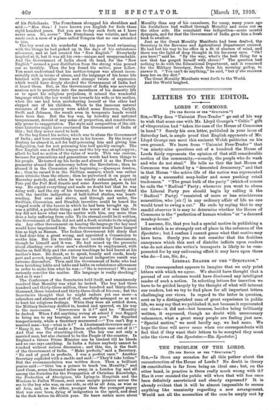LETTERS TO TIM EDITOR.
LORDS V. COMMONS.
[To TER EDITOR OP THZ "SPECTATOR."
Sin,—Why does "Unionist Free-Trader" go out of his way to wish that some one with Mr. Lloyd George's " Celtic " gift of vituperation had " taken the case of the House of Commons in hand " P Surely his own letter, published in your issue of Saturday last, is ample proof that English opponents of Mr. Lloyd George can meet this eminent Welsh politician on his own ground. We learn from "Unionist Free-Trader" that "on ninety-nine questions out of a hundred the House of Lords fairly represents the opinion of that still considerable section of the community,—namely, the people who do wash and who do not steal." He tells us that the last House of Commons was elected by a "demented democracy," and that in that House " the active life of the nation was represented only by a successful soap-boiler and some pushing retail tradesmen." " The great bulk of the party" (which of course he calls the "Radical" Party; whenever you want to abuse the Liberal Party you should begin by calling it the "Radical" Party) "consisted of more or less mischievous nonentities, who [sic !] in any ordinary affair of life no one would trust to swing a cat." He ends by saying that to any candid observer it is easy to determine whether the House of Commons is the "perfection of human wisdom" or "a damned monkey-house."
I assume, Sir, that you bad a special motive in publishing a letter which is so strangely out of place in the columns of the Spectator; but I confess I cannot guess what that motive may have been. Surely you do not consider that the fruitless annoyance which this sort of diatribe inflicts upon readers who do not share the writer's transports is likely to be com- pensated for by any enlivening effect it may have upon those who do.—I am, Sir, &c.,
LIBERAL READER OF THE " SPECTATOR."
[Our correspondent appears to imagine that we only print letters with which we agree. We should have thought that a perusal of our columns would have disabused any intelligent reader of such a notion. In selecting letters for insertion we have to be guided largely by the thought of what will interest our readers, but we try to find place for all important letters challenging our views. In regard to the letter in question, sent us by a distinguished man of great experience in public life, we may say that we published it, not because it represented our views—it did not—but because, besides being brilliantly written, it expressed, though no doubt with unnecessary vehemence, what a great many people are feeling just now. " Special motive," we need hardly say, we had none. We hope the time will never come when our correspondents will feel that if they want their letters to be accepted they must echo the views of the Spectator.—ED. Spectator.]










































 Previous page
Previous page